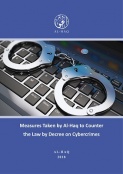The Law by Decree on Cybercrimes No. 16 of 2017 (hereinafter Cybercrimes Decree Law or Decree Law) violates and impedes the right to freedom of expression, right to privacy, and right of access to information, seriously jeopardizing human rights. In addition to the continued absence of the Palestinian Legislative Council (PLC), Palestinian civil society organisations were not allowed the opportunity to view or take part in relevant deliberations before the Cybercrimes Decree Law was approved and published in the Palestinian Official Gazette. As such, the Cybercrimes Decree Law was approved in secret. This approach was entirely inconsistent with the principles of transparency, community participation, and National Policy Agenda 2017-22: Putting Citizens First. According to the latter document, the government stresses its commitment to full partnership with, and openness to, the civil society in public policy and law-making making processes. The Decree Law also stands in stark contrast against international conventions, to which the State of Palestine acceded, and relevant international principles.
The approval of the Cybercrimes Decree Law was met with widespread opposition from civil society organisations. Al-Haq led a lobbying and advocacy campaign to amend and bring the Decree Law into full compliance with international human rights conventions. In this vein, Al-Haq published detailed comments on the Cybercrimes Decree Law. Based on these comments, Al-Haq held multiple meetings with civil society organisations to consolidate their position on the Decree Law. Al-Haq also organised meetings and workshops, which brought together human rights defenders and activists to explain the risks posed by the Cybercrimes Decree Law, and contribute to creating a public opinion that rejects the violations its provisions invoke. On 30 August 2017, Al-Haq sent a legal notice to the Prime Minister, demanding that substantive amendments be made to the Cybercrimes Decree Law to ensure consistency with the provisions of the Palestinian Basic Law and international human rights conventions and standards.



